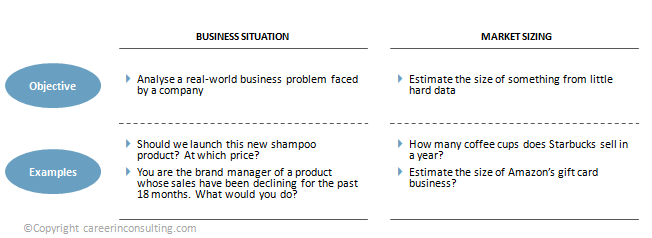Do you know what top consulting firms’ favorite tool to select only top candidates is?
You got it.
That’s the famous and feared case interview.
Aka, case study or problem-solving interview.
But what is a case interview?
You’re about to find out.
Moreover, do you know:
- How is the case interview process structured?
- What are the 2 main types of cases?
- What are the consulting firm’s objectives behind the case interview?
- What are case interviewers looking for?
- What do consulting firms expect from you during a case interview?
- What does a successful case interview look like?
Let’s answer these questions in this article.
What is a case interview
The case study is a real-life problem that you have to solve in a (very) short period of time.
This means the case will be based on a real project the interviewer worked on.
The interviewer had between 1 and 3 months to solve this problem, when you have between 20 and 40 minutes.
Pretty unfair, isn’t it?!
What is happening during these 20 to 40 minutes?
To begin with, the interviewer will ask you a question. That’s the problem statement.
The problem statement can be (very) short, like “Your client is facing declining profit. How would you help them?”.
Or the problem statement can be (very) long with a lot of information more or less relevant.
Then it’s your turn.
You are in charge of driving the discussion to find a solution to this problem.
In other works, you have to investigate why the problem is happening and propose a recommendation to fix this problem.
In a nutshell, what you have to do could be split into 4 steps:
- Ask relevant questions to clarify the problem and get more information about it
- Take a pause – between 30 seconds to 2 minutes, given the interviewer – to think of an approach (aka structure or issue tree)
- Walk the interviewer through your structure and ask for information and data; that’s the analysis part of the case
- Synthesize the case and give your recommendation
I have given you a brief introduction here.
There is a lot to say about:
- What’s the best strategy to approach a case?
- How to clarify the problem statement?
- How to structure your approach (your issue tree)?
- How to be MECE (Mutually Exclusive, Collectively Exhaustive)?
- How to use existing frameworks (Porter’s five forces, 4Ps, etc.)?
- What are the good questions to ask during the case?
- How to synthesize the case and give your recommendation?
- And a lot more….
Let me now share a few words about the 2 main types of cases. Cases may come in 2 forms:
- Form #1: market sizing, or
- Form #2: business situation
ATTENTION: there are cases where the interviewer mixes the two so you can have a market sizing in a business situation case.

What do consulting firms expect from you?
During a case study, interviewers have 2 main objectives before they decide whether you can go to the next round:
- Objective #1: see how you think through a complex problem
- Objective #2: assess your ability to develop a structured and logical approach to solving a problem
Let me repeat the first objective of Consulting firms: see how you think through a complex problem.
The objective is NOT to find a solution to the question asked at the beginning of the case.
No.
The objective is to show the interviewers how you think.
I repeat: the game you are playing consists in explaining to the interviewers your thinking process, not finding a solution to the problem.
The interviewers want to assess how you will break down the problem into smaller pieces.
They want to assess whether you can identify the most important issues of the problem.
They expect you to discuss what implications your findings have.
How can you show the interviewers what your thinking process is?
Think out loud.
Explain what you are doing to the interviewers and why it’s important for the problem.
For instance, in a market analysis, explain why Competition is an important issue.
Otherwise, the interviewers might think you have learned some frameworks by heart and don’t understand why you want to discuss this issue.
Now let’s discuss the second objective of Consulting firms:
Assess your ability to develop a structured and logical approach to solving a problem.
Do you know what consultants do?
What is their primary day-to-day job?
.
.
.
They are problem-solvers. Their job consists in solving their clients’ most important and critical problems.
And Consultants do so with a strong belief: luck or X years of industry experience don’t help solve a problem.
Consultants from Bain or from any other top firms strongly believe that problems are solved with a logical and structured approach.
When you join a consulting firm, you will have many pieces of training in problem-solving.
And you will become an expert in problem-solving!
But before these pieces of training, you have to demonstrate that you have the ability to think through a problem:
- break down the problem and identify the key drivers
- have a clear and logical reasoning
- be curious and show a probing mind
- have the ability to synthesize
- have a facility with numbers
- show business sense
Here is the good news: you can learn how to develop these skills.
You can have the exact same problem-solving training as Consultants from McKinsey or the Boston Consulting Group have.
Remember that thinking out loud and showing the interviewers how you reason is more important than getting the right answer.
Successful vs. unsuccessful candidates
One thing separates candidates who get a job offer from candidates who don’t receive a job offer.
Candidates who get a job offer manage to turn the case interview into a conversation.
The case interview was not a job interview anymore but a conversation between 2 consultants solving a case together.
It’s not easy.
To turn the case interview into a conversation, you have to master the case interview techniques to focus on connecting with the interviewer.
This should be your objective: build strong case interview and problem-solving skills to focus on engaging with the interviewer.
Things that could help engage with the interviewer: show enthusiasm about the case, react to the information shared by the interviewer, and ask good follow-up questions.
Give me your feedback
I hope you now have a better understanding of what a case interview is.
If you enjoyed this post, I’d be very grateful if you’d help it spread by emailing it to a friend or sharing it on Twitter or Facebook.
Thank you!
Please give me feedback in the comment section below or share what you struggle with the most with case interviews.
I would be glad to answer any further questions you might have.
Or contact me if you need any help!
All the best on your case interviews!
Sébastien
Get 4 Complete Case Interview Courses For Free

You need 4 skills to be successful in all case interviews: Case Structuring, Case Leadership, Case Analytics, and Communication. Join this free training and learn how to ace ANY case questions.
SHARE THIS POST

Pingback: Free online resources to prepare for case interviews - Career in Consulting
Great content! This is exactly the sort of thing I was looking for. Thanks for your help 🙂
Love this! Thank you for sharing such an insightful article!
Thanks!